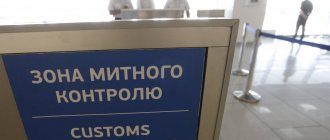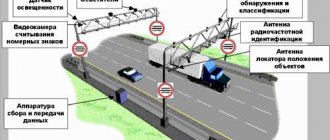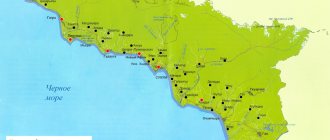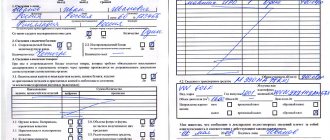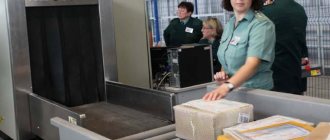Turkey's customs regulations are in line with European standards. Most of the country’s border crossings provide a system of “green” and “red” corridors - each is indicated at the entrance by appropriate lighting and the signatures “Nothing to declare” or “Goods to declare.” If a tourist is sure that he has nothing to declare, he goes through customs control in the “green” corridor according to a simplified procedure. And if there are items in your hand luggage or luggage that are subject to written declaration, you need to go through the “red” corridor, where the declaration is filled out, a permit is issued and customs duties are calculated.
Below we will consider: what can be taken out of Turkey and what to take with you, what restrictions and rules apply to goods and currency, what needs to be declared, and what is completely prohibited from crossing the border. Please note: the rules for importing and exporting things are different!
Watch the video with up-to-date information about entering Turkey in 2020:
Documents for crossing the Turkish border
There is a visa-free regime for citizens of Russia and Ukraine in the Republic of Turkey. Therefore, a valid passport is sufficient for entry; both a regular and a biometric one are suitable.
Read more about documents for crossing the Turkish border.
Ukrainian passport
Fines for visa violations
Turkish legislation provides for appropriate penalties for non-compliance with the visa-free regime. The measures taken are determined by the severity of the offense committed. A monetary fine or a ban on entry into the country for a certain period may be imposed.
Payment of the fine is carried out at special cash desks, which are located at border crossing points (airport, port, etc.) and an amount in the amount of the assigned fine is deposited into them. If it is not possible to pay the fine or the migrant refuses to pay, he is obliged to leave the country. In addition, as a person who has violated the laws, he will be entered into the computer database of persons who have lost the right to enter Turkey.
For those who travel to Turkey with their own vehicle
By car or motorcycle, you can arrive in an overseas country by ferry to Istanbul or by land through the following border checkpoints:
Greece - Turkey: on the border of these countries there are two checkpoints, “Kastanies - Pazarkule”, “Kipoi - Ipsala”.
Bulgaria - Turkey: there are three control points, “Captain Andreevo - Kapıkule”, “Malko Trnovo - Dereköy”, “Lesovo - Hamzabeyli”.
Turkey - Armenia: crossing borders is prohibited; due to conflicts between countries, checkpoints are closed.
Georgia - Turkey: two points were built on the border of the countries, one of them is stylish and modern - Sapri. “Sarpi/Sarpi – Sarp/Sarp”, “Vale/Vale – Posof/Posof”.
Azerbaijan - Turkey: there is one border gate, “Sadarak / Dilucu / Dilucu”.
Iran - Turkey: there are two checkpoints, the first is located near the city of Khoy, the second in the province of Hakkari and is the third checkpoint in Turkey with a green TIR-EPD stripe. “Razi / Razi - Kapikoy / Kapıköy”, “Serow / Serow - Esendere / Esendere”.
Iraq - Turkey: there is only one border crossing, “Zaho - Khabur / Habur”.
Syria - Turkey: several checkpoints operate, but it is dangerous for tourists to travel through them.
Important! Due to the unstable situation in the country, some checkpoints are periodically temporarily closed. Check the current situation at the border immediately before your trip.
Read more about conflicts with neighbors in the article “Security in Turkey.”
Georgian-Turkish border / Photo: the last don/flickr
Required documents for the driver to cross the Turkish border:
International passport . For Ukrainians, you can present an internal passport in the form of an ID card.
Driver license . Must be valid, you can show a national or international driver's license, it is advisable to have its apostilled, certified translation into Turkish.
Technical passport . Vehicle registration certificate, i.e. vehicle.
Documents certifying ownership of a car or motorcycle. If you are traveling with a power of attorney, you will need to have it translated into Turkish or English.
Vehicle insurance - in the Republic of Turkey they require an international Green Card insurance policy.
There are no entry fees, and some roads have tolls. Read more about tolls, traffic rules and fines in Turkey.
Fuel can be transported to Turkey only in a fuel tank, in cans and other containers - it is prohibited.
Let's look at what can be transported across the Turkish border.
Healthy Tourism Program
The Turkish authorities have introduced the “Healthy Tourism” program, which includes a wide range of measures for the safety of transportation, accommodation, monitoring the health status of employees of tourism institutions and guests of the country.
The certification program consists of 4 points:
"Passenger Health and Safety"
— precautionary measures applied to tourists from the moment of their arrival in the country until their return flight. The list of these measures includes restrictions on the entry of passengers into terminals without a protective mask, provision of free protective masks to passengers, the use of thermal imaging cameras to measure body temperature at the entrance to airport buildings, the availability of sufficient quantities of disinfectants and disinfection booths, and the use of special precautionary measures in regarding passengers who are identified as a potential risk group.
"Employee Health and Safety"
— a set of precautionary measures to ensure the physical and psychological health of personnel in transport, residential premises and public catering facilities.
"Precautionary measures at sites"
— a set of measures necessary to prevent the spread of the epidemic. To prevent new infections, special measures have been developed that must be taken in residential premises, catering establishments, and entertainment areas, and these measures are clearly defined within the framework of the certification program. The program ensures the implementation and monitoring of the implementation of measures such as social distance, limiting external contacts, isolation, which are necessary to control the spread of the pandemic both among personnel working at tourism facilities and among guests of the country.
"Transport Precautions"
— a set of measures and rules for air, land and sea transport. Trainings for transport employees, personnel health monitoring, vehicle disinfection.
In recent months, more than 6 thousand tourism facilities, including hotels, restaurants and airports, have received the Healthy Tourism certificate. List of certified objects. Certification criteria
If a tourist gets sick.
72 hours before the flight, passengers fill out an electronic form in which they indicate contacts and information about their place of stay in Turkey. Personal data is used to identify persons who have had contact with a sick passenger. So, if during thermometry before passport control a passenger’s temperature is higher than 37.8 °C, he is invited to a special room, where after half an hour his temperature is measured again and he is examined by a doctor. If the temperature persists, the tourist takes a free PCR test. If the result is negative, the passenger goes to rest.
In case of a positive test for coronavirus, the tourist is taken by ambulance to the hospital for examination. In a hospital, the decision on hospitalization or isolation at the place of rest of a tourist with a positive test for COVID-19 is made by a doctor. If the disease occurs without symptoms, the traveler is placed in an isolation ward in a hotel under the supervision of a hotel doctor. After 5-7 days, repeated testing for coronavirus is carried out. If the test again shows the presence of the virus, then treatment, observation and isolation continue. If the test is negative, then the tourist, based on the doctor’s conclusion, is discharged and continues his vacation at his hotel or returns to Russia.
If a tourist at the hotel develops a temperature of 37.8 °C or more or complains of symptoms of illness, he will be referred to the hotel doctor, who will decide to call an ambulance to take the tourist to the hospital. If COVİD-19 is detected in one family member, a PCR test (covered by insurance, free for tourists) is taken by all members of the vacationer’s family.
Regarding payment for medical services, there are special provisions for those persons who remain in a hotel for a 14-day quarantine. According to the “health certificate,” hoteliers undertake to pay all expenses associated with the accommodation and food of the isolated person. However, based on the results of quarantine, if it exceeds the number of days of rest on the paid voucher, either the tour operator or the client himself must pay for the flight to Russia. This question remains open. The insurance company fulfills its obligations to pay transportation costs upon returning to their homeland in the event of hospitalization of the client, and not staying in quarantine.
If a tourist wants to be tested for COVID-19 on his own initiative, he must do so at his own expense. Moreover, if the result is positive, the costs will be covered by the insurance policy. Otherwise, the costs are borne by the client himself.
Did not find an answer to your question? Ask it in the travelers chat:
Join the chat
Import and export of money, Türkiye
You can import and export any currency in any amount. However, if you enter the country with a total of $5,000 in cash (in any currency), you must include it in the customs declaration.
By the way. When traveling through Turkish lands, it is advisable to take cash in dollar bills or euros - it is most profitable to exchange them for lira, and you can pay with them in many places.
For more tips on financial transactions, read the article on shopping in Turkey.
What else does Turkey require to declare: customs rules require that jewelry, any precious metals, stones and products made from them be included in the declaration if the total amount exceeds $15,000. If you are taking family jewelry or other expensive antiques with you, be sure to include it in the declaration so that you do not have any troubles when leaving the country. Keep in mind that Turkish customs very strictly checks the transportation of antiques and jewelry, tobacco and alcohol.
Many people go to the most tourist city of the country, Istanbul, not so much for relaxation as for shopping. Read more about the shops in Istanbul - oriental sets, outfits and decor just begging to be included in their suitcase. When choosing expensive products, keep your receipts. Turkish customs also advises categorically to refrain from purchasing and exporting: items of cultural heritage, even stones, shells and other natural fragments are considered; antiques - products over 50 years old, with no exception national costumes, ancient household items and coins.
Old Turkish coins / Photo: eltpics/flickr
Turkish banks that do not charge commission
AKBANK
The most successful option for Russians is to use the AKBANK bank, but it is extremely important to take into account one nuance - when a conversion proposal appears on the ATM screen during the operation, you need to press the “No” button. At the next stages, the question will be repeated, in this case you need to perform the same action. Without commission, Russian tourists can also withdraw money from HALKBANK or PTT Bank.
Import and export of animals
If you are traveling with smaller brothers, get an international veterinary passport from the veterinary clinic, get vaccinated and get an official certificate about them. You will also need a document stating that the pet does not represent any breeding value and an English-language veterinary certificate (Form 1), which is exchanged at the border for an international certificate. Without these documents, Turkish customs will not allow the animal to pass through. Check with your pet carrier's rules for transporting pets, whether by plane, ferry or bus. They often require that they be kept in a special container; large dogs must be muzzled and wearing a collar.
One person can cross the border of the Republic of Turkey with a maximum of 2 animals (dogs, cats, birds) or 10 aquarium fish.
Without special permission, the import and export of exotic, rare animals, endangered species of fauna and flora is prohibited.
Read more about the necessary documents for traveling with a pet.
Currency volume
No one is interested in the money on travelers’ bank cards. Restrictions apply to cash currency. Any amount is allowed to be imported, but quantities exceeding $5,000 must be declared.
Read more here: What currency is best to take with you to Turkey?
You can export up to 10 thousand dollars. Over $10,000 (with the exception of travel expenses) employees ensuring order at the border are required to receive permission from the Central Bank of Russia.
Import and export of food products across Turkish borders
You can take with you to Turkey without declaring: up to 3 kg of dried fruits, up to 1 kg of vegetables/fruits, up to 2 kg of sweets, 1 kg of coffee and 0.5 kg of tea, although there is little point in bringing them, because the local ones are quite tasty and affordable. But bringing milk, meat and meat products into the country is strictly prohibited.
It is believed that you can transport products across the Turkish border whose total cost does not exceed 100 liras (up to 15 €) and weighing no more than 5 kg per adult. Although in fact it is extremely rare that luggage is checked for compliance with this item.
Note! Officially, coffee, tea, cocoa, and spices are prohibited for export. However, according to the experience of tourists who bring such goods home, conflicts with customs officers do not arise on this basis.
Turkish spices / Photo: my.travels/flickr
Do I need to indicate alcohol in the declaration?
There are 2 corridors at the control: “red” and “green”. Citizens who do not have goods that are subject to declaration pass through the “green” lane. In case of “red”, it is necessary to provide the inspection authorities with the appropriate document, which shows the excess of the duty-free quantity.
When entering an Asian republic the following are subject to mandatory declaration:
- Cash in any currency exceeding the equivalent of $5,000. Restrictions do not apply to bank cards.
- Jewelry totaling $15,000.
- Securities.
- Electronics, equipment in quantity exceeding established standards.
Alcohol-containing drinks and tobacco products are not subject to written registration. Cognac and wine must be in the luggage of adult travelers. Excesses will be confiscated.
Import and export of souvenirs and personal belongings from Turkey
If you are bringing gifts and souvenirs from home, be modest - do not fork out more than 300 € (total cost), otherwise you will have to go through the “red” corridor and declare them. The same restrictions apply to the purchase of hotels exported from Turkey if you spent more than 5,000 liras (about 715 €) on them.
What can be brought to Turkey without declaration from items for personal use (not for sale): individual sports equipment, scooter, bike, skateboard; musical instruments, but no more than 3 pieces; perfumes - limit yourself to 5 bottles (up to 120 ml each); personal equipment such as a smartphone, camera, laptop, tablet - 1 subject each; stroller and toys for the baby.
export from Turkey those things that were allowed to be imported into the country, and as for purchased gifts, be sure to pay attention to their cost.
Important! Keep receipts for goods purchased in Turkish stores and receipts from currency exchange offices - they may be required upon departure.
Photo: Victor Yastrebov/flickr
Cash lira
Official currency can be used to pay everywhere - in shops, restaurants, public transport and markets. Liras are used in all resort cities of Turkey, starting with Alanya and ending with Istanbul. In some retail outlets, euros and dollars are indicated on the price tags, but even in this case, you can make a purchase for lira, you just need to ask the seller about it.
Euros and dollars are also used, but the exchange rate directly at retail outlets is often unfavorable. Sometimes guides deceive visitors, claiming that liras are not accepted everywhere, but this has nothing to do with the truth.
What is prohibited from crossing the borders of Turkey?
In addition to the above-mentioned unacceptable objects, Turkish customs regulations do not allow the import and export of:
- Weapons, ammunition and explosives.
- Narcotic and psychotropic substances.
- Toxic, potent substances, radioactive materials.
- Pornographic materials or materials promoting racism or violence.
- Items of historical and cultural value.
Jugs of historical value - Türkiye / Photo: Feridun F. Alkaya/flickr
If any prohibited goods have permits for transportation across the border, then they must be declared at customs.
How to protect yourself when crossing the border
The most common violations during border and customs control are the transportation of prohibited items, exceeding quantitative restrictions and inaccurate (incomplete) declaration of things or money transported across the border. Therefore, before traveling, analyze your luggage, especially when returning with new purchases: make sure that you do not have prohibited items and double-check what needs to be declared. You need to take customs rules seriously and responsibly, otherwise you will face not only a fine, but also confiscation of goods, temporary arrest or other sanctions.
When going through border control, keep a close eye on your belongings, children and animals. Don't let your kids go for a walk while you're standing in line.
At the airport in Turkey / Photo: Karen/flickr
Please note that fraud does occur during border crossings. To avoid becoming their victim, follow simple rules. Do not agree if strangers or people you barely know (for example, a passenger from the next seat) approach you with a request to hold their bag/purse/folder/book, especially if they ask you to carry some things through security checkpoints. Also, you should not agree to requests from strangers to hand over a letter/parcel/luggage or any other things, because they may contain hiding places for narcotic or toxic substances, explosive devices and other prohibited items. Whatever the excuse, explanation or reward, politely refuse!
All this concerns Turkish customs regulations. However, when traveling abroad, do not forget about the requirements of your country.

